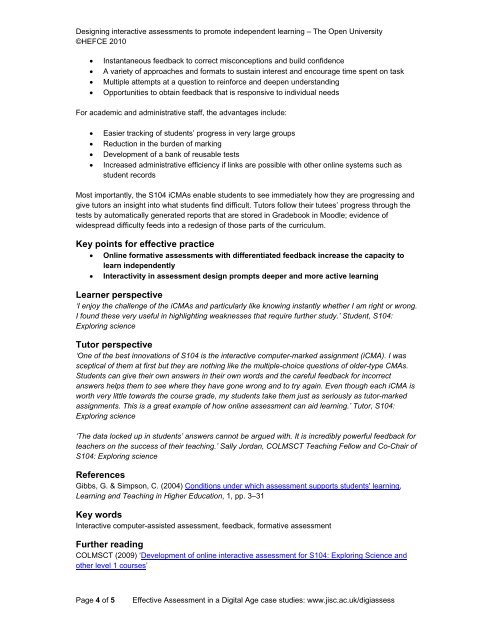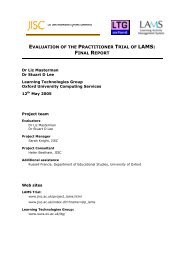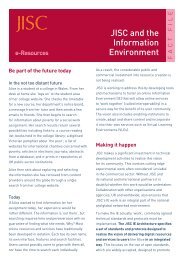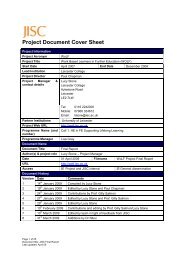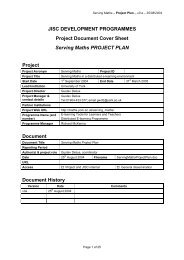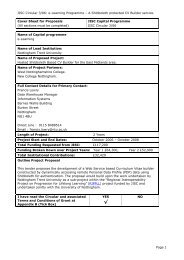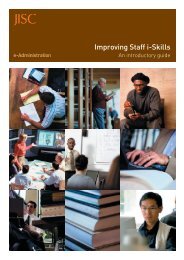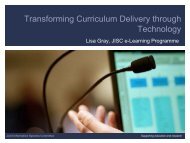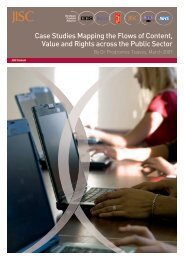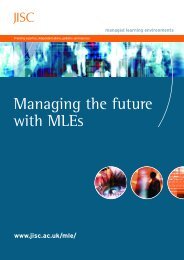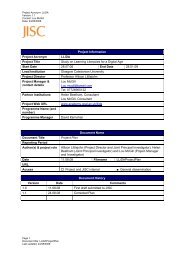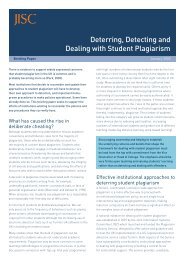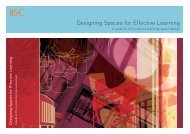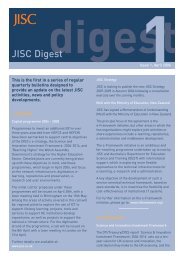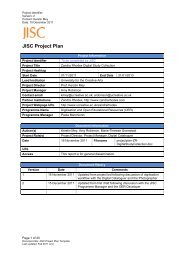Case study 4: Designing interactive assessments to promote ... - Jisc
Case study 4: Designing interactive assessments to promote ... - Jisc
Case study 4: Designing interactive assessments to promote ... - Jisc
You also want an ePaper? Increase the reach of your titles
YUMPU automatically turns print PDFs into web optimized ePapers that Google loves.
<strong>Designing</strong> <strong>interactive</strong> <strong>assessments</strong> <strong>to</strong> <strong>promote</strong> independent learning – The Open University<br />
©HEFCE 2010<br />
• Instantaneous feedback <strong>to</strong> correct misconceptions and build confidence<br />
• A variety of approaches and formats <strong>to</strong> sustain interest and encourage time spent on task<br />
• Multiple attempts at a question <strong>to</strong> reinforce and deepen understanding<br />
• Opportunities <strong>to</strong> obtain feedback that is responsive <strong>to</strong> individual needs<br />
For academic and administrative staff, the advantages include:<br />
• Easier tracking of students’ progress in very large groups<br />
• Reduction in the burden of marking<br />
• Development of a bank of reusable tests<br />
• Increased administrative efficiency if links are possible with other online systems such as<br />
student records<br />
Most importantly, the S104 iCMAs enable students <strong>to</strong> see immediately how they are progressing and<br />
give tu<strong>to</strong>rs an insight in<strong>to</strong> what students find difficult. Tu<strong>to</strong>rs follow their tutees’ progress through the<br />
tests by au<strong>to</strong>matically generated reports that are s<strong>to</strong>red in Gradebook in Moodle; evidence of<br />
widespread difficulty feeds in<strong>to</strong> a redesign of those parts of the curriculum.<br />
Key points for effective practice<br />
• Online formative <strong>assessments</strong> with differentiated feedback increase the capacity <strong>to</strong><br />
learn independently<br />
• Interactivity in assessment design prompts deeper and more active learning<br />
Learner perspective<br />
‘I enjoy the challenge of the iCMAs and particularly like knowing instantly whether I am right or wrong.<br />
I found these very useful in highlighting weaknesses that require further <strong>study</strong>.’ Student, S104:<br />
Exploring science<br />
Tu<strong>to</strong>r perspective<br />
‘One of the best innovations of S104 is the <strong>interactive</strong> computer-marked assignment (iCMA). I was<br />
sceptical of them at first but they are nothing like the multiple-choice questions of older-type CMAs.<br />
Students can give their own answers in their own words and the careful feedback for incorrect<br />
answers helps them <strong>to</strong> see where they have gone wrong and <strong>to</strong> try again. Even though each iCMA is<br />
worth very little <strong>to</strong>wards the course grade, my students take them just as seriously as tu<strong>to</strong>r-marked<br />
assignments. This is a great example of how online assessment can aid learning.’ Tu<strong>to</strong>r, S104:<br />
Exploring science<br />
‘The data locked up in students’ answers cannot be argued with. It is incredibly powerful feedback for<br />
teachers on the success of their teaching.’ Sally Jordan, COLMSCT Teaching Fellow and Co-Chair of<br />
S104: Exploring science<br />
References<br />
Gibbs, G. & Simpson, C. (2004) Conditions under which assessment supports students' learning,<br />
Learning and Teaching in Higher Education, 1, pp. 3–31<br />
Key words<br />
Interactive computer-assisted assessment, feedback, formative assessment<br />
Further reading<br />
COLMSCT (2009) ‘Development of online <strong>interactive</strong> assessment for S104: Exploring Science and<br />
other level 1 courses’<br />
Page 4 of 5<br />
Effective Assessment in a Digital Age case studies: www.jisc.ac.uk/digiassess


